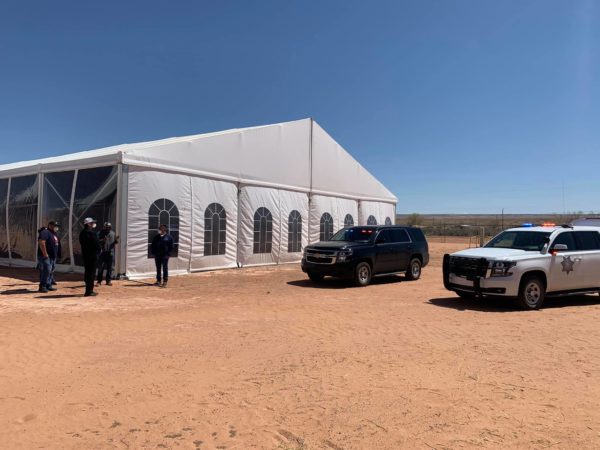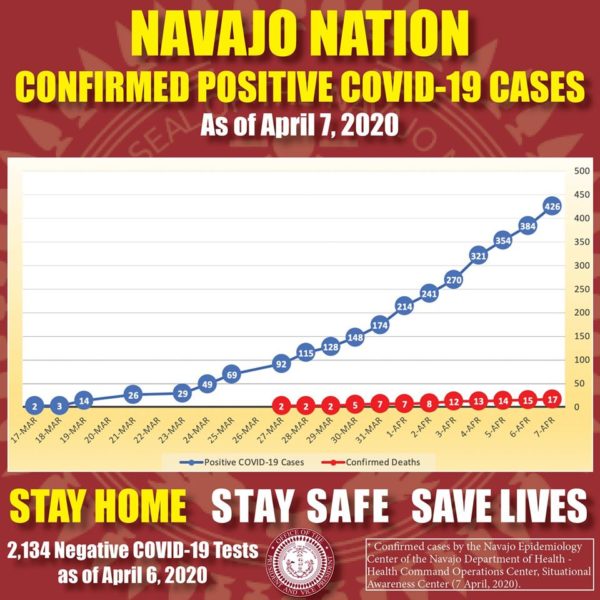
- Details
- By Levi Rickert
WINDOW ROCK, Ariz. — The Navajo Department of Health and Navajo Area Indian Health Service announced 42 new confirmed cases of coronavirus COVID-19 on Tuesday, April 7, which brought the Navajo Nation’s cumulative total to 426.
In the same announcement, two more deaths were reported since Monday, which brings the death toll to 17 confirmed deaths related to COVID-19.
The 426 confirmed positive cases include the following counties:
- Navajo County, AZ: 164
- Apache County, AZ: 44
- Coconino County, AZ: 102
- McKinley County, NM: 32
- San Juan County, NM: 66
- Cibola County, NM: 8
- San Juan County, UT: 7
- Socorro County, NM: 2
- Bernalillo County, NM: 1
"The Navajo Nation can implement and enforce curfews and restrictions, but ultimately it’s up to you. We must practice T’áá hwó’ ajít’éego, self-determination, our Diné people must know that they also have the power to prevent the spread of COVID-19. We have the power to save lives, especially those that have compromised immune systems. We must work together to protect our people, our way of life and who we are as Diné,” Navajo Nation President Jonathan Nez said.

President Nez continues to urge the general public to use protective masks, including homemade masks, and protective gloves if they are required to work or when going to stores for essential items such as food and medicine.
The Navajo Nation’s daily curfew continues to be enforced by the Navajo Police. Checkpoints are setup regularly and citations and fines up to $1,000 may be issued for those who violate the curfew order that requires residents to remain home between 8:00 p.m. and 5:00 a.m. each day.
This weekend’s 57-hour curfew will begin on Friday at 8:00 p.m. until Monday at 5:00 a.m.
For more information including reports, helpful prevention tips, and more resources, please visit the Navajo Department of Health’s COVID-19 website at http://www.ndoh.navajo-nsn.gov/COVID-19. To contact the main Navajo Health Command Operations Center, please call (928) 871-7014.
For up to date information on impact the coronavirus pandemic is having in the United States and around the world go to: https://www.worldometers.info/coronavirus/country/us/?fbclid=IwAR1vxfcHfMBnmTFm6hBICQcdbV5aRnMimeP3hVYHdlxJtFWdKF80VV8iHgE
For up-to-date information about COVID-19, Native News Online encourages you to go to Indian Health Service’s COVID-19 webpage and review CDC’s COVID-19 webpage.
More Stories Like This
Native News Weekly (August 25, 2024): D.C. BriefsUS Presidents in Their Own Words Concerning American Indians
2026 Native American 40 Under 40 Class Announced
Monday Morning: (January 5, 2026): Articles You May Have Missed This Past Weekend
Native News Weekly (January 4, 2026): D.C. Briefs
Help us defend tribal sovereignty.
At Native News Online, our mission is rooted in telling the stories that strengthen sovereignty and uplift Indigenous voices — not just at year’s end, but every single day.
Because of your generosity last year, we were able to keep our reporters on the ground in tribal communities, at national gatherings and in the halls of Congress — covering the issues that matter most to Indian Country: sovereignty, culture, education, health and economic opportunity.
That support sustained us through a tough year in 2025. Now, as we look to the year ahead, we need your help right now to ensure warrior journalism remains strong — reporting that defends tribal sovereignty, amplifies Native truth, and holds power accountable.
 The stakes couldn't be higher. Your support keeps Native voices heard, Native stories told and Native sovereignty defended.
The stakes couldn't be higher. Your support keeps Native voices heard, Native stories told and Native sovereignty defended.
Stand with Warrior Journalism today.
Levi Rickert (Potawatomi), Editor & Publisher

